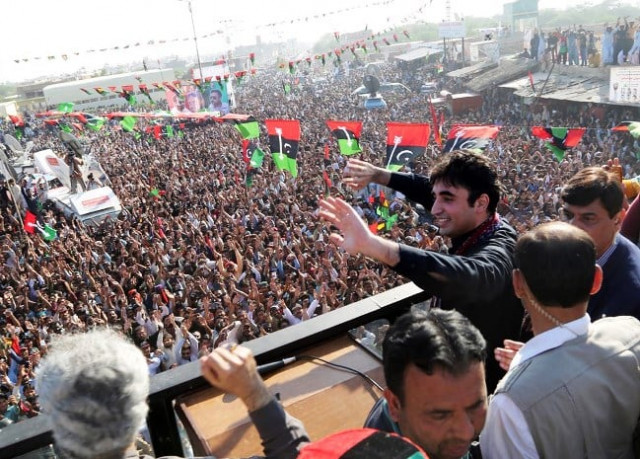While referring to him as ‘baby’ Bilawal during a public address in Malti, Imran said,
“You can no longer use your grandfather’s and mother’s picture at your back to call yourself a leader and get votes.”
Hitting back at the PTI chief for calling him ‘baby Bhutto’, Bilawal, while addressing PPP supporters in Badin, asked,
“Chacha (uncle) Imran, has anyone ever taught a fish how to swim?”
Despite the fact that the Pakistan People’s Party (PPP) is a wounded opponent, it reduced the party to a shadow of its former mighty self and now even losing Badin to former loyalist Zulfiqar Ali Mirza. With the party’s demise so obvious, surely it makes arguments against its hallmarks, dynastic politics, stronger than ever. Or does it?
The debate on dynastic politics is a long one and the concept of dynasties in politics itself goes a long way back in history. Even if one looks at the world’s modern set up, dynasties are not easy to spot, they form a sizeable chunk of current political maps.
Hillary Clinton: Wife of a former US president,
Jeb Bush: Brother and son of former US presidents,
Justin Trudeau: Son of a former Canadian prime minister,
Lee Hsien Loong: Son of Lee Kuan Yew, Singapore’s revered first prime minister
Najib Razak: Son of Malaysia’s second prime minister and nephew of the third,
Cristina Fernandez de Kirchner: Widow of previous Argentinian president.
In Europe, the House of Lords in the UK continues to have the hereditary right.
Examples from our own part of the world are just as obvious – from the PPP chain of leadership, from grandfather to grandson, to the Congress in India following the exact same pattern and from the Sharif brothers in Pakistan to the Mujibur Rahman – Sheikh Hasina and Ziaur Rehman – Khaleda Zia nexus in Bangladesh.
But is hereditary politics wrong?
Even though dynastic politics in Pakistan include Pakistan Muslim League- Nawaz (PML-N) and Awami National Party (ANP) too, PPP and Bilawal Bhutto have been the main targets of this argument in the country. A large part of the criticism towards PPP’s dynastic ways comes from Pakistan Tehreek-e-Insaaf (PTI), which has not engaged in dynastic politics for the most part, even though Reham Khan was all set to join the electoral machinery before her divorce with Imran Khan.
While criticism of dynastic politics is justified, there are some ground realities that one should not shy away from. It is pivotal to understand that the development and strength of political dynasties is dependent on the way a society is structured.
Political connections and nepotism is an active part of daily life in Pakistan. This is precisely why a large part of our business elite, at least at some point in time, does engage in political activity directly or indirectly. The reason behind this is simple – engaging in politics will utilise every chance to ensure a good career for their future generations. Politics is viewed as particularly promising because, although the pay on paper may appear meagre, it is supplemented by unwritten powers and perks that can be invaluable – not only for the officeholder but also for his descendants.
This trend has even deeper roots within our society. In matters of marriage for example, even today, the prime focus remains on the bigger picture and not the individual. A person’s personal accomplishments may be minimal, but they fall back if the family knows the right people in power, thus completing the classic power-connections-over-individual-ability set up of Pakistani society.
Instead of criticising political dynasties, one needs to criticise the makeup of the society. Do we not strive to get things done by pushing for political connections whenever possible? Do we not engage in nepotism in one way or the other? If we had the chance to engage in dynastic politics and then pass on the future leadership to our children, would we not do this?
The answer to all these questions is a resounding yes.
Criticising Bilawal is easy. But it is not Bilawal’s fault that his mother died. It is not Benazir’s fault that her father died. Our society is structured in a manner where it would have been ridiculous to even suggest that someone else other than a Bhutto family member take charge of the PPP.
So before we point a finger at the current flag bearers of dynastic politics in Pakistan, we should take a good look in the mirror and point a finger at ourselves for supporting activities in this society that support hereditary power.



COMMENTS
Comments are moderated and generally will be posted if they are on-topic and not abusive.
For more information, please see our Comments FAQ